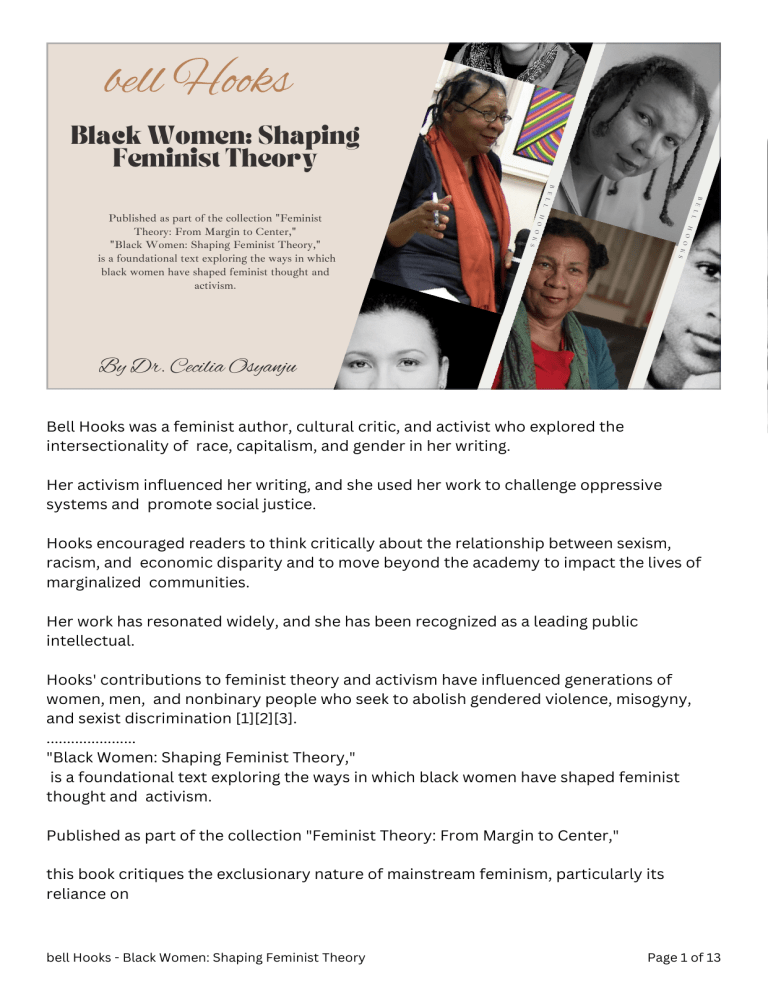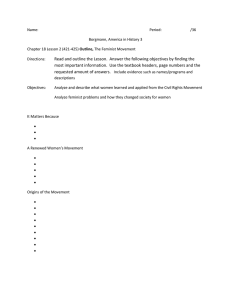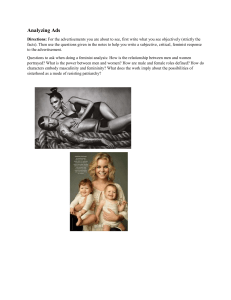bell Hooks - Black Women Shaping Feminist Theory (Compiled by Dr. Cecilia Osyanju)
advertisement

bell Hooks Black Women: Shaping Feminist Theory B B E L L E L L H O H O O K O K S S Published as part of the collection "Feminist Theory: From Margin to Center," "Black Women: Shaping Feminist Theory," is a foundational text exploring the ways in which black women have shaped feminist thought and activism. By Dr. Cecilia Osyanju Bell Hooks was a feminist author, cultural critic, and activist who explored the intersectionality of race, capitalism, and gender in her writing. Her activism influenced her writing, and she used her work to challenge oppressive systems and promote social justice. Hooks encouraged readers to think critically about the relationship between sexism, racism, and economic disparity and to move beyond the academy to impact the lives of marginalized communities. Her work has resonated widely, and she has been recognized as a leading public intellectual. Hooks' contributions to feminist theory and activism have influenced generations of women, men, and nonbinary people who seek to abolish gendered violence, misogyny, and sexist discrimination [1][2][3]. ...................... "Black Women: Shaping Feminist Theory," is a foundational text exploring the ways in which black women have shaped feminist thought and activism. Published as part of the collection "Feminist Theory: From Margin to Center," this book critiques the exclusionary nature of mainstream feminism, particularly its reliance on bell Hooks - Black Women: Shaping Feminist Theory Page 1 of 13 white, middle-class, and professional spokeswomen. Hooks highlights the contributions of women of color and poor women to the feminist movement, advocating for a more inclusive approach to women's liberation. bell Hooks - Black Women: Shaping Feminist Theory Page 2 of 13 Black Women: Shaping Feminist Theory What is a Theory? A theory, in the scientific context, is a wellsubstantiated explanation of an aspect of the natural world that incorporates laws, hypotheses, and facts. Outside of science, the term "theory" can also refer to a belief, policy, or procedure proposed as the basis of action, or an ideal or hypothetical set of facts, principles, or circumstances. A theory, in the scientific context, is a well-substantiated explanation of an aspect of the natural world that incorporates laws, hypotheses, and facts. It is a coherent set of interconnected ideas that are empirically testable and aim to describe, integrate, and explain observed phenomena. Outside of science, the term "theory" can also refer to a belief, policy, or procedure proposed as the basis of action, or an ideal or hypothetical set of facts, principles, or circumstances. In this broader sense, a theory need not be empirically verified, although it may still serve as a useful tool for analyzing situations or making decisions. ................. Bell hooks is recognized internationally as a prominent voice in feminism and cultural criticism. Her works continue to inspire scholars and activists alike, encouraging dialogue and reflection on the intersections of identity, culture, and power. bell Hooks - Black Women: Shaping Feminist Theory Page 3 of 13 Key themes discussed in "Black Women: Shaping Feminist Theory 1. Historical Absence of black women in Feminist Narratives 2. Recognition of Diverse Experiences 3. Challenge to Individualistic Ideologies 4. Exploration of Feminism and Racism 5. Intersectionality in Oppression Key themes discussed in "Black Women: Shaping Feminist Theory": * The historical absence of black women in dominant narratives of feminism * The need to recognize the full complexity and diversity of women's experiences * Challenging the competitive, atomistic ideologies of liberal individualism * Examining the relationship between feminism and racism * Emphasizing the importance of recognizing gender alongside other forms of oppression such as class, race, and sexual orientation .................... bell Hooks - Black Women: Shaping Feminist Theory Page 4 of 13 Main Argument Feminism in the United States falls short in representing and dealing with the challenges faced by black women Here are the main reasons she gives: Historical Neglect Ignoring Different Identities Individual Competition Main Argument In bell hooks' book "Black Women: Shaping Feminist Theory," she talks about how feminism in the United States falls short in representing and dealing with the challenges faced by black women, who experience various forms of oppression. Here are the main reasons she gives: 1. Historical Neglect:Regular feminism often forgets or ignores the stories and struggles of black women. It doesn't recognize their significant contributions to the feminist movement and the unique difficulties they face due to sexism, racism, and classism. 2. Ignoring Different Identities: Traditional feminism usually concentrates only on gender, leaving out other important aspects that shape women's lives, like their race, ethnicity, social status, and sexual orientation. 3. Individual Competition: Liberal feminism encourages a competitive outlook, where individual success is put before working together as a group. This undermines the unity among different groups of women. bell Hooks - Black Women: Shaping Feminist Theory Page 5 of 13 Intersectionality is widely used to illustrate the interplay between discrimination, whether it’s based on gender, race, age, class, sexual identity, religion, or more. bell Hooks - Black Women: Shaping Feminist Theory Page 6 of 13 Hooks wants to highlight these problems to challenge the current ways of thinking and inspire the creation of a more inclusive, detailed, and empowered feminist mindset. She wants a feminism that can effectively deal with the larger systems of oppression faced by black women. In the end, she calls for a change towards understanding women's experiences more broadly and forming alliances across various differences. Hooks' work reminds us that feminism should always listen and respond to the needs of all women, no matter where they come from, to make real progress towards equality and justice. bell Hooks - Black Women: Shaping Feminist Theory Page 7 of 13 Hooks discusses how white women may experience sexism but can also participate in oppressive behaviors due to their racial privilege, whereas black men, despite facing racism, can engage in sexist behavior. Hooks discusses how white women may experience sexism but can also participate in oppressive behaviors due to their racial privilege, whereas black men, despite facing racism, can engage in sexist behavior. This dynamic arises from the intertwined nature of oppressive forces, such as sexism, racism, and classism, which influence individuals' capacity to perpetuate or resist oppression. This concept is known as intersectionality, introduced by Kimberlé Crenshaw in 1989 to examine how various forms of oppression intersect and affect individuals differently based on their social locations. bell Hooks - Black Women: Shaping Feminist Theory Page 8 of 13 Unique Position of Black Women Hooks argues that this marginalized position grants black women a distinct vantage point from which to critique the dominant oppressive systems of racism, classism, and sexism. 1. Collective Occupational Disadvantage 2. Intersectional Oppression 3. Limited Opportunities for Oppression 4. Distinct Vantage Point 5. Utilizing Perspective for Change 6. Crucial for Feminist Struggles Unique Position of Black Women: In her work, bell hooks highlights the unique societal position of black women, emphasizing that they are collectively situated at the bottom of the occupational ladder with an overall social status lower than any other group. This positioning exposes black women to intersecting forms of oppression, including sexism, racism, and classism. Unlike white women and black men who can both experience and perpetuate oppression due to their respective privileges, black women are often denied the opportunity to assume roles of exploiters or oppressors within institutionalized structures. Hooks argues that this marginalized position grants black women a distinct vantage point from which to critique the dominant oppressive systems of racism, classism, and sexism. By recognizing and utilizing this perspective, black women can challenge existing power dynamics and envision alternative frameworks that resist hegemonic structures. This recognition of their unique standpoint is crucial for black women to engage in feminist struggles that address not only gender but also race and class disparities effectively[1][2]. ......................... - **Collective Occupational Disadvantage:** bell Hooks - Black Women: Shaping Feminist Theory Page 9 of 13 - Black women are collectively positioned at the lowest rungs of the occupational ladder, holding an overall social status lower than any other group. Intersectional Oppression: - They face intersecting forms of oppression, including sexism, racism, and classism. Limited Opportunities for Oppression: - Unlike white women and black men, black women often lack opportunities to assume roles of exploiters or oppressors within institutionalized structures. Distinct Vantage Point: - The marginalized position provides black women with a unique vantage point to critique dominant oppressive systems of racism, classism, and sexism. Utilizing Perspective for Change: - Recognizing and utilizing this perspective enables black women to challenge existing power dynamics and envision alternative frameworks resistant to hegemonic structures. Crucial for Feminist Struggles: - The acknowledgment of this unique standpoint is crucial for black women to actively engage in feminist struggles that effectively address not only gender disparities but also those related to race and class. bell Hooks - Black Women: Shaping Feminist Theory Page 10 of 13 Call to Action Hooks discusses how white women may experience sexism but can also participate in oppressive behaviors due to their racial privilege, whereas black men, despite facing racism, can engage in sexist behavior. Call to Action Bell hooks urges black women to use their unique position as outsiders to challenge and change the unfair power structures that promote racism, classism, and sexism. By recognizing their distinct viewpoint and standing up against oppression, black women can help create a new way of thinking and acting that opposes the current oppressive norms. To accomplish this goal, hooks suggests that black women should: 1. Recognize their shared experiences of oppression and develop a deeper understanding of their common struggles. 2. Engage in critical self-reflection, examining their own complicity in maintaining oppressive structures and seeking to dismantle those practices. 3. Develop a strong sense of community and solidarity with one another, fostering mutual support and collaboration. 4. Challenge dominant narratives and institutions that exclude or misrepresent black women's exp eriences. 5. Create spaces where black women's voices can be heard and valued, promoting authentic representation and visibility. 6. Envision and implement alternatives to current oppressive systems, creating new possibilities for freedom, justice, and equity. 7. Collaborate with others across lines of difference, forming alliances with people who share similar goals and values. bell Hooks - Black Women: Shaping Feminist Theory Page 11 of 13 Through this process, black women can become agents of change, actively working to disrupt and dismantle oppressive structures and build a more just society. Their unique perspective provides a vital lens for understanding and addressing the complex interplay of race, class, gender, and other forms of inequality. bell Hooks - Black Women: Shaping Feminist Theory Page 12 of 13 Thank You bell Hooks - Black Women: Shaping Feminist Theory Page 13 of 13




